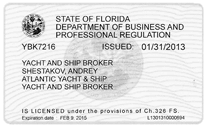Want to sell a yacht?
Determine a reasonable price
To avoid an extensive selling process, settle the reasonable price for a vessel together with your broker. He will help you to determine the fair market value, using data on a yacht model taken from a specialized information resource. Access is available only for registered yacht brokerage houses.

Most brokers in the US and Canada prefer concluding sales contracts on the ground of the central agency listing, which plays an important role in relationship of the parties.
It is entirely beneficial when brokers cooperate with each other in order to sell a vessel more quickly. In this case, they share the earned commission. Yacht brokers collect their fees at the moment of the vessel’s sale. The commission amount should be specified in the contract, signed by a vendor and broker. If another broker finds a buyer, then the total sum of commission charged is divided between both brokers.
Yacht brokers often specialize in particular vessel sizes and types, as well as geographic regions. Try to choose a skilled professional who deals with the company which specializes on the desired yacht type.
Advertising Strategy
A professional yacht broker will properly design a publicity campaign, using the most effective advertising media. For example, a commercial, 37-foot Sunseeker Sport Fisher yacht will be greatly different from a 74-foot, luxury Sunseeker Manhattan. The main goal of every broker is to work out a strategy oriented to a certain core audience.
An experienced yacht broker should prepare ad copy and distribute it to print and electronic media and mail it to clients and other brokers. He should also take care of advertising distribution on fliers which are displayed at specialty yacht shows.
When you deal with a skilled broker, you will get a look at your yacht’s advertising through his or the company’s website, and through specialized resources, available for a wider audience. Ads dealing with a broker give one more great advantage–the opportunity to place a sales ad in the closed system meant for information exchange among brokers only.

Sea Trials and Examination
We suggest that both buyers and vendors perform sea trials of vessels before transfer of ownership to a new person. This provision has to be made in order to avoid a case such as, when a new owner has complaints regarding possible fault-finding and invisible technical faults, after the transaction has been closed. Technical examination of a yacht should be based on a sales transaction and must be performed before a buying decision has been made and after transferring 10% of the prepayment to a broker’s bank account. A buyer pays for vessel haulout and the services of inspectors and surveyors who actually execute examination of the yacht. It is quite reasonable, because a buyer is motivated to detect all possible faults of a yacht. To check main motors and generators, the buyer should hire an engine engineer. Your broker should be present during sea trials and examination. He will assist you with deciding which questions to ask during these procedures. He also is going to help you determine how much time it takes to eliminate revealed defects. With the help of a broker you will properly estimate the cost of materials and equipment.

Confidentiality and Loyalty Preservation Between a Yacht Broker and Client.
Shestakov Yacht Sales aims to develop professional relationships with ship owners, based on mutual confidence and the preservation of confidentiality. We go beyond standard obligations that are applied to purchasing or buying a vessel only. We guarantee the maintenance and charter of your yacht and assist you with keeping her in favorable condition so that you will continue to be her happy owner.
National Origin of a Yacht
After passing the registration procedure, a vessel qualifies to sail under the flag of a certain country, just as the right for property registration and a variety of other services. Passing the registration means that a country whose flag is going to be put on a pillar acts like the adpromissor of legal norms, confirms adherence of a vessel purchase and her good technical condition. The government should assure that these regulations comply with national and international requirements and testify this over all parties involved. The 1982 UN Law of the Sea Convention (UNCLOS), confirmed by 154 states, provides that any vessel must sail under the flag of a certain state (Article No. 92 of the Convention). According to article No. 91, every state should determine the conditions of its nationality assignment to vessels, registration of vessels within their territories and right to sail under their flags. Vessels are to be of those state nationalities which authorize sailing under its flag. In addition, there must be a factual connection between a vessel and a state. Every state issues corresponding documents to ship owners. If a state exercises the right to assign nationality to vessels, it is obliged to take upon itself determinate obligations, which secure the submission of vessels to jurisdiction and control. In order to fulfill these obligations a flag-state adopts the agreed laws and provisions which cover:
- standards of structures, equipment and certification of vessels;
- hiring a crew, its work arrangements and crew members’ training;
- safe navigation of vessels;
- contamination control and minimization of ocean pollution;
- investigation of accidents involving vessels sailing under a certain state flag
Rules for vessel registration comply with provisions of currently accepted international conventions for maritime traffic. For example, vessels which have been used for more than 20 years may be registered in terms of a special inspection conclusion only. Yachts and boats which have been used for less than 20 years are allowed to be registered in running order.

What are the “Accessible” and “Locked” Ship’s Registers?
Any state, even out of access to sea, may authorize vessels to sail under its flag. National ship registers may be of the local (locked) type. They register the vessels that belong to state residents only (individual privates and legal entities [Russia]). There are also ship registers of the accessible type. They are able to confer the right to register a vessel to anybody who wants to (among them are the Cook Islands, Panama, Sierra Leone, Belize, and the BVI)
How to Choose the State for Yacht Registry
While choosing the state for yacht registry, the following factors are to be taken in consideration:
- Financial: learn the difference in cost of registration and reregistration in the name of the further owner, tax rates for salary payments to the yacht personnel;
- Technical: in some cases it is necessary to present a yacht with registration and statuary examinations;
- International legal: possibility of state’s participation in bilateral and multilateral contracts in order to avoid dual taxation and to assignation of favorable treatment, e.g. with marine transportation.
Permanent and Temporary Vessel Registration
Temporary vessel registration allows you to properly prepare all documents for the permanent registration. Temporary registration clearance involves issuing the certificate, valid for up to 6 months to a ship owner or his representative, and the radio user permit, valid for up to 6 months. In both cases the registration should be executed by the Directorate of the Merchant Marine. This organization issues the registration certificates and ship station licenses.

Advantages of Vessel Registration in the Name of an Offshore Company
If a yacht is under an offshore company flag, the change of ownership procedure is performed much more easily. The clear advantage for doing so is the absence of tax expenses when a vessel is selling. The owning company’s equities are sold, not the vessel herself. This allows the company not to change the owner in the register; by doing this, it is possible to allow the yacht not to pass through extra procedures of changing the benefiting owner. Most offshore companies offer easy vessel registration terms and an annual extension of this registration type. These conditions are often accompanied by the absence of a vessel use income taxation, indirect tax/VAT (depending on the jurisdiction) and customs duties.














